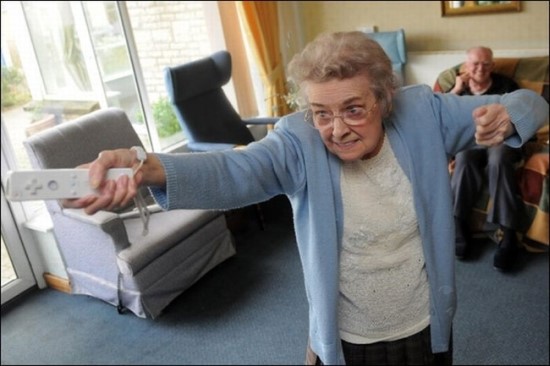New research has shown that you can prevent some of the effects of Alzheimer’s disease by playing active video games that are so popular with children. According to scientists, playing a game that involves physical exercise is best, such as those available for the Xbox Kinect and Wii to give your brain and body a workout as you age. This study comes in the wake of the news that there is now a game that can be used to detect Alzheimer’s disease, and it is clear that this condition receives a large amount of attention from people in both technology and medical fields.

A study of nearly 1,000 people, most of them retired, found that by playing for just 15 minutes a day, 3 times a week, can help keep our brain healthy and sharp as we age.
This was the first research of this type in the UK which reviewed a number of ‘exergames’ and thier effects on the brain. The people in the study were in their 60s, 70s and 80s and they were playing Nintendo Wii sports games that required them to dance, and even go kayaking in 3-dimensional lake. It was found that these activities provided far more benefits than simple exercise, such as brisk walking. Scientists reported that the combination of physical coordination and effort of these games actually improved the mental function of the participants.
Not just for Alzheimer’s
This kind of activity can also help in the protection against dementia, and a variety of other neurological disorders, such as Parkinson’s disease, improving brain function in people who already are suffering with neurological disorders. Perhaps it won’t be long before we start seeing gaming consoles as an integral part of elderly care home life. For Care homes Taunton, visit a site like Notaro, a supplier of top Care homes Taunton
The study involved numerous clinical trials that looked into the impact of an active game on our reactions and cognitive skills.
As we age, there are a variety of naturally declining brain functions, including those related to concentration, spatial awareness, and memory. A variety of neurological conditions, such as Parkinson’s and Alzheimer’s disease, mild cognitive impairment, and dementia also a cause of the decline of cognitive functions, and this leads to a decrease in our ability to accomplish the tasks of everyday life.

Scientists have been amazed to see, thanks to the evidence from this research, how these kinds of games were able to significantly improve our overall cognitive function. He stated that the games were very useful for executive function, visuo-spatial ability and attention.
The multiple studies included interactive dance games and cybercycling with an interactive bike / treadmill that had the participants complete various tasks, or avoid obstacles placed in their way as they pedalled or walked around various tracks. Others were using a VR kayak game, which required participants to coordinate their upper body movements to navigate through virtual rivers and lakes.

